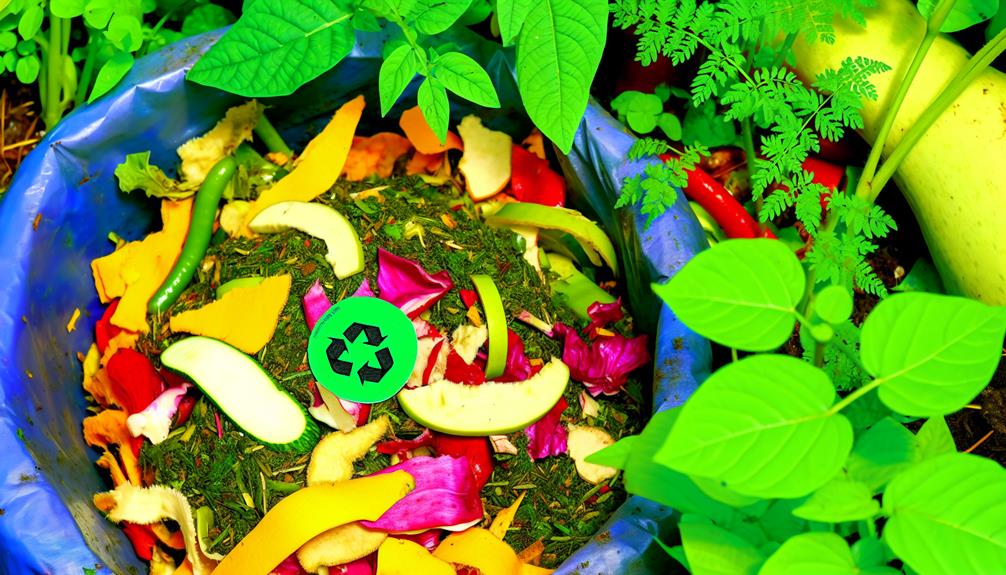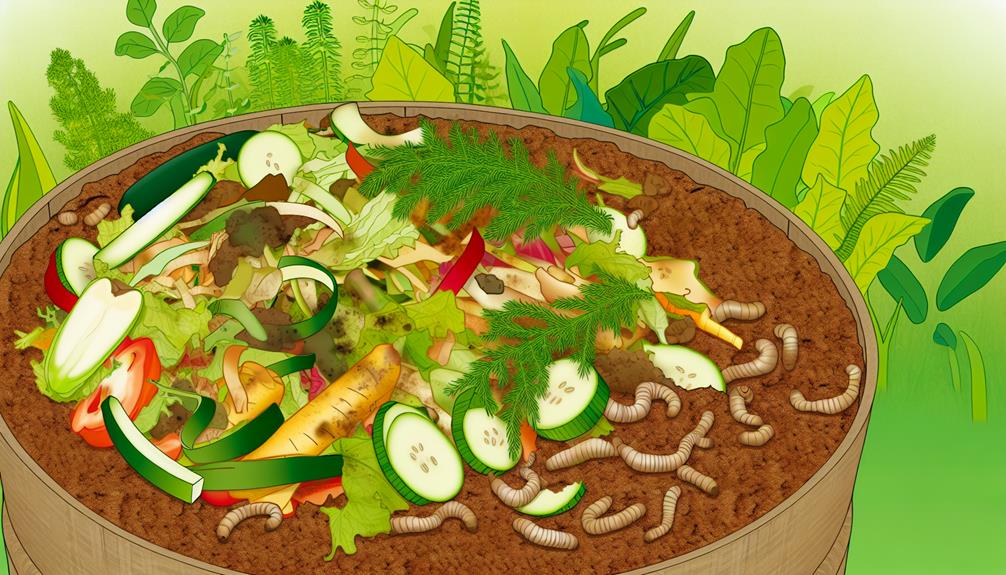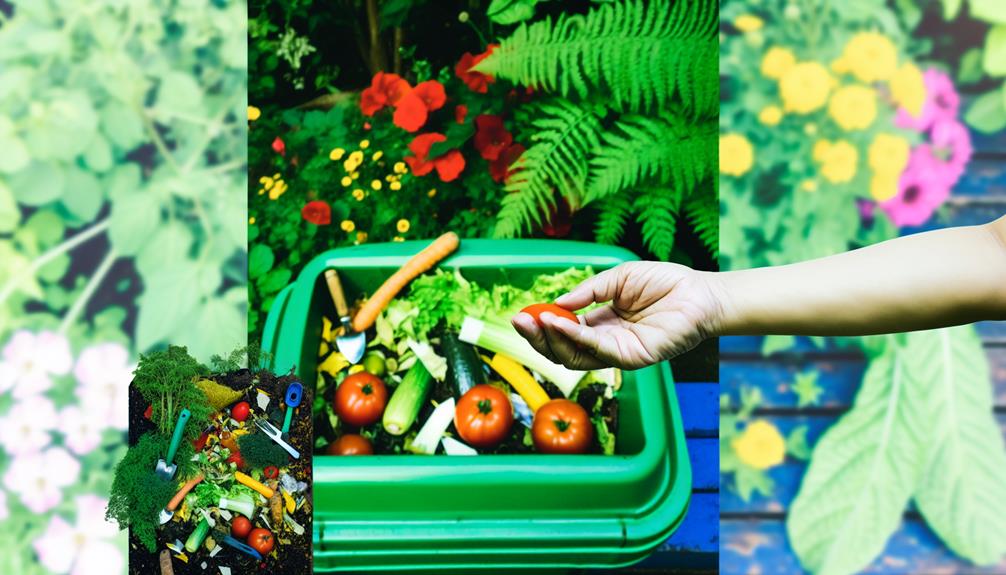

You should remove vegetable stickers before composting. They are made of durable, non-biodegradable materials like plastic and synthetic adhesives, which can contaminate your compost and hinder decomposition. These stickers often contain toxic inks and chemicals that are not suitable for organic composting.
Always take off stickers from fruits and vegetables before adding them to your compost. This step guarantees that your compost remains free from contaminants and maintains high quality. Proper composting involves balancing green and brown materials, maintaining moisture, and regularly turning the pile.
By being mindful of these practices, you will create healthier compost and contribute to a sustainable environment. Want more tips to improve your composting?
Vegetable stickers, those small labels you find on produce, are used to identify the type and origin of fruits and vegetables. These stickers have a fascinating history and origins, dating back to the mid-20th century. Initially, they were simple paper tags attached to produce. Over time, sticker designs evolved to include various colors, logos, and even barcodes to streamline the identification process.
You mightn’t realize it, but these stickers play an essential role in the agricultural and retail industries. They help store employees quickly scan and price items at the checkout counter, ensuring you get the right price for your fruits and veggies. Additionally, by identifying the origin of the produce, these stickers can inform you where your food comes from, fostering a sense of connection to global agricultural practices.
Sticker designs have also become more sophisticated, often including the produce’s PLU (Price Look-Up) code, which helps categorize the item. Some stickers even feature branding from specific farms or organic labels, providing you with additional information about the produce’s quality and cultivation methods.
Understanding these small yet significant stickers can deepen your appreciation for the journey your food takes from farm to table.
Also Read: Can You Compost Body Wash?
Most vegetable stickers are made from a combination of paper, plastic, and adhesive materials. These materials are chosen for their durability and ability to adhere to various surfaces. The paper component makes the sticker printable, while the plastic provides flexibility and water resistance. However, this combination of materials poses challenges for composting.
Sticker adhesives are designed to be strong and long-lasting. They often contain synthetic chemicals that don’t break down easily in a compost pile. This means that even if the paper or plastic components begin to decompose, the adhesive might persist, causing potential issues in your compost.
Another concern is ink toxicity. The ink used to print logos and information on the stickers can contain harmful chemicals. While these inks are usually safe for human contact, they may not be beneficial for the delicate ecosystem within your compost bin.
To ensure your compost remains healthy, it’s important to take into account the impact of these stickers. Removing them before tossing vegetable scraps into your compost bin is a good practice. This simple step can help maintain the quality of your compost and support a thriving composting community.
Understanding how organic matter breaks down in compost can help you optimize the decomposition process. At the heart of composting is microbial activity. Microorganisms like bacteria and fungi break down organic materials into simpler substances. This process is known as organic breakdown.

To create the ideal environment for these microbes, you should maintain the right balance of green and brown materials, moisture, and aeration.
Green materials, such as vegetable scraps and grass clippings, provide nitrogen, while brown materials, like dry leaves and cardboard, offer carbon. A healthy compost pile has a carbon-to-nitrogen ratio of about 30:1.
Keep the pile moist, akin to a damp sponge, to support microbial activity. Turning the compost regularly introduces oxygen, essential for aerobic microbes that speed up decomposition.
Temperature also plays an important role. As microbes break down organic matter, they generate heat. Ideally, your compost should reach temperatures between 135°F and 160°F to break down materials efficiently and kill off pathogens. Use a compost thermometer to monitor the heat.
Also Read: Can You Compost Blood?
Stickers on produce can have a major impact on the environment, especially when they don’t decompose in compost. These small items seem insignificant, but they accumulate over time and create several issues. When you dispose of produce with stickers in your compost bin, the stickers can contaminate the final compost product. This contamination can affect soil quality and plant health.
Here are four key points to consider:
Considering these points, it’s clear that the environmental impact of produce stickers extends beyond just your compost bin. By being mindful of these factors, you contribute to a more sustainable and environmentally friendly practice.
Also Read: Can You Compost Black-Eyed Peas?
Given the environmental challenges posed by produce stickers, adopting best practices for composting can help guarantee their negative impact. Start by removing any stickers from your fruits and vegetables before adding them to your compost pile. This simple step guarantees that non-compostable materials don’t end up contaminating your organic waste.

Next, use proper composting techniques to manage your compost effectively. Layer your compost with a mix of green (nitrogen-rich) and brown (carbon-rich) materials. Maintain a balance to speed up decomposition and prevent unpleasant odors.
Here’s a quick guide to balance your compost materials:
| Green Materials | Brown Materials | Pro Tip |
|---|---|---|
| Fruit and vegetable scraps | Dried leaves | Chop materials into small pieces |
| Coffee grounds | Shredded paper | Turn compost regularly |
| Grass clippings | Cardboard | Keep it moist but not soggy |
| Manure (herbivore) | Wood chips | Add aeration to avoid clumping |
| Tea bags (no staples) | Sawdust | Avoid meat and dairy products |
Also, monitor the moisture level of your compost. It should be as damp as a wrung-out sponge. Turning your compost every few weeks helps aerate it, speeding up the breakdown of organic waste.
Accidental ingestion of vegetable stickers usually poses minimal health risks. They’re made from food-grade materials. However, it’s advisable to remove them to make sure you’re consuming only what belongs in your community’s meals.
You can remove vegetable stickers easily by applying a bit of heat. Use a hairdryer to soften the adhesive types. Your community will appreciate your effort to keep produce clean and sticker-free!
You’re probably wondering if vegetable stickers affect the taste of your produce. Rest assured, the sticker adhesive doesn’t cause any taste alteration. Just peel them off before eating, and your veggies will taste just fine.
Yes, there are biodegradable alternatives! You can find eco-friendly labels that use sustainable adhesives. These options align with your commitment to a greener lifestyle and help you belong to a community that cares about the environment.
You can’t recycle vegetable stickers with other paper products. Doing so causes paper contamination, complicating the recycling sorting process. Join your community in proper recycling practices to guarantee a cleaner and more sustainable environment for everyone.
When composting, it’s best to remove vegetable stickers since they often contain non-compostable materials like plastic. These stickers can hinder the decomposition process and contribute to microplastic pollution.
Always check for eco-friendly alternatives or use a separate waste system for sticker disposal. By being mindful of these practices, you can guarantee your compost remains pure and efficient, contributing positively to the environment.
Remember, small steps in composting make a big difference!
